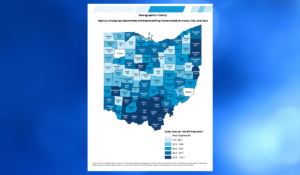Diabetes Role in Strokes


Diabetes Role in Strokes
By Kiera Frank, CHW
If you have Diabetes, are you at a higher risk for a stroke? According to the American Diabetes Association (ADA), people living with diabetes are at 1.5 times higher risk of a stroke than those living without Diabetes. A Stroke is a condition where the blood supply to the brain is affected. Strokes can lead to permanent damage including numbness, pain, visual problems, communication problems, and problems with thinking or memory. Strokes can occur at a much younger age in individuals who have Diabetes. Having Diabetes does not necessarily mean you will have a stroke.
Strokes in Diabetics are commonly caused by high blood glucose readings over a period of time. The excess sugar in the blood can cause higher deposits of fat or blood clots on the blood vessel walls. These deposits and clots can completely block or restrict vessels in the neck or brain. This ultimately leads to a decrease/blockage of oxygen and blood supply to the brain. This is the time when a stroke can occur.
Other than stroke, diabetes type 2, characterized by high blood sugar levels, also extends to put a person at two to four times greater risk of developing heart failure than someone without diabetes. The heart failing to pump oxygenated blood through the body is also a risk factor for diabetes. People who are diabetic can also consult a doctor (from the Cardiovascular Group or the likes) or a health specialist to further discuss the chances of stroke or a heart failure.

Common warning signs of a Stroke include: numbness or weakness in one side of the body, drooping of one side of the face, sudden confusion, trouble comprehending, trouble speaking, dizziness, unable to balance, unable or trouble walking, trouble seeing out of one or both eyes, double vision, and severe headache. If signs and symptoms of a Stroke appear, please do not hesitate to call 9-1-1 right away to help prevent permanent damage to the brain. You may also want to contact a lawyer as soon as possible, which you can do if you click here. This is important if you believe the stroke to be caused by something like the wrong medication or a drop in blood sugar levels as the result of being in circumstances where they have been unable to eat or use an epi-pen. This is often the case when employers have not made allowances for a diabetic person to manage their condition, meaning the employer may be liable for the stroke. This is something that a lawyer can help you with.
If you already have a higher risk of a Stroke there are still ways you can lower your risk of having a Stroke such as keeping your blood glucose levels in a target range (talk to your health care provider about your ideal blood glucose range), keeping your cholesterol levels and blood pressure in range, eating a healthy diet, getting a proper amount of physical activity and, if needed, medication that your health care provider prescribes can help. If you smoke, quitting would lower your risk for strokes as well. The closer your numbers are to your target ranges the less likely the chances of having a Stroke are.
The Meigs County Health Department can help you lower your risk of Stroke via its Community Health Worker (CHW) Program (which assists high-risk Type II Diabetics) and with tobacco cessation services. Please call 7409926626 Monday – Friday from 8 a.m. to 4 p.m. for more information or to schedule an appointment.









